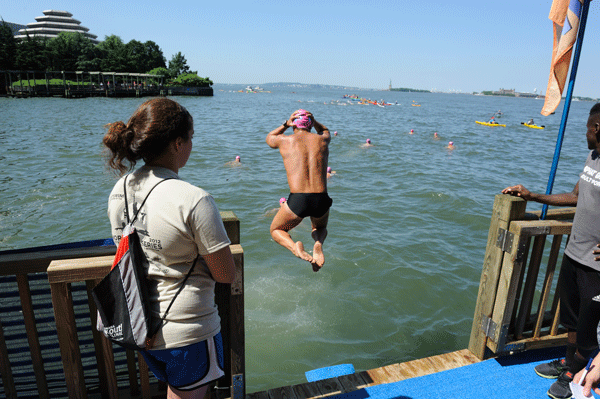
BY TERESE LOEB KREUZER | One way to spend a beautiful summer day in Manhattan is to swim around the island.
That’s what 73 people from 11 countries elected to do on Sat., June 23 when they jumped into the Hudson River in Battery Park City’s South Cove and headed downriver on a 28.5-mile swim. There were 38 solo swimmers ranging from ages 17 to 59. The rest were members of relay teams.
The first-ever swim around Manhattan took place in 1915, according to Morty Berger, founder of NYC Swim, the race’s sponsor. Over the years, the Manhattan Marathon Swim was held sporadically until the early 1990s, when it re-emerged as a fixture on New York City’s summer calendar, Berger said. It has continued ever since.
Large and poisonous marine life in Manhattan waters is minimal, but swimmers do have to contend with cruise ships, ferries and commercial boats that create choppy water conditions. They also must grapple with tides and currents on the Hudson.
Around a dozen of this year’s marathon swimmers were Triple Crowners, according to Berger. Every year, he said, enrollment for the race fills up within an hour of its opening. It costs just under $2,000 to participate, including several days’ worth of transportation and room and board.
Seven hours, 30 minutes and 26 seconds after leaving South Cove, the first swimmer returned. Twenty-two-year-old Abby Nunn from Richmond, Virginia, came in more than 17 minutes before the second-place winner, Javier Gutierrez, 38, of Marina del Rey, California.
Not having seen Nunn, Gutierrez asked, “Am I first?” when he touched the finish line. “You’re the first man,” he was told.
Nunn just graduated from Yale University in New Haven, Connecticut, where she had the highest grade-point average of any senior varsity athlete. She majored in the history of science and medicine, and plans to attend the University of Virginia’s School of Medicine in the fall.
She started swimming at age five and began competitive swimming at 16. Prior to the Manhattan Island Marathon Swim, the longest open-water race that she had ever participated in was 12.5 miles (less than half the length of the Manhattan swim).
“I can’t believe that I made it!” said Nunn. “I just wanted to finish. I wasn’t thinking about a gold place or anything. I just wanted to get around.”
Nunn didn’t quite have the easy swim down the river she was told she’d have: the Hudson River, she said, turned out to be fairly choppy.
“In the last half hour, I kept saying to myself, ‘Keep swimming! Keep swimming!’” she said. “When I was fighting really big waves at the end, I started to feel fatigued, but for the first six hours, I felt great.”
The last person to come in was Steve Faulkner, 50, of Barrie, Ontario. It took him 10 hours and 12 minutes to do the swim. The second-to-last swimmer to complete the course had arrived more than 30 minutes prior.
The sun was setting by the time Faulkner approached North Cove in Battery Park City, around a quarter-of-a-mile from the finish line. The tide that had given the other swimmers an extra push down the river had turned, and he was swimming against it. A New York Police Department (N.Y.P.D.) scuba team and a U.S. Coast Guard vessel accompanied him as onlookers at the shore egged him on.
When Faulkner arrived at the finish line, he was hardly able to walk, but he was smiling. Faulkner’s mother, Annette, said she waited for him for hours.
“I was afraid he wouldn’t be able to finish,” she said, tearing up. “This meant so much to him. He worked so hard for this.”
After the race, as Bob Needham, 59, of Lake Oswego, Oregon, toweled off, someone remarked to him, “There are probably very few people in the world who could do what you did today.” Needham agreed, remarking that the community of open-water swimmers is a small one.
The next NYC Swim event, the Statue of Liberty race, will occur on Fri., June 29 and take swimmers on a three-quarter of a mile course around Liberty Island. The race will be followed by the Brooklyn Bridge swim, which will take place the morning of Sun., July 15. For more information, visit www.nycswim.org.

































